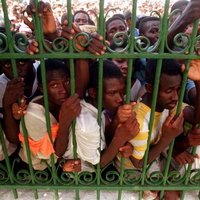I’ve long felt that the discussion of the Afghan government’s many shortcomings tends to exagerrate the importance of the corruption factor in driving the insurgency. To the extent that the government is corrupt, that’s more a problem for those funding it — namely, international donors. The problem in Afghanistan is that the government is not just corruptbut also incompetent, leaving service vacuums in terms of security andlaw and order that are filled by the Taliban. But worse still, all thereporting suggests that government officials are also actively engagedin either targeting the population or else complicit with those thatdo. I was […]
Afghanistan Archive
Free Newsletter
I mentioned a WSJ article last week that reported that Georgia would be deploying a brigade to Afghanistan. That raised my eyebrows, since a Georgian brigade can be as much as 3,300 troops. But Joshua Keating found this WaPo article putting the number of Georgia troops at a more realistic 900. The WSJ article has since been revised to reflect that number as well, with no mention of a brigade anymore. (Keating raises another interesting point, namely, why would Georgia think that contributing troops to Afghanistan will help its NATO chances, which I’ll try to discuss a bit later.) As […]
In a joint news conference with U.S. Defense Secretary Robert Gates,Afghan President Hamid Karzai stated that Afghanistan is 15 to 20 yearsaway from being able to afford a modern, expansive military force.Gates says that he does not see that long of a time frame and hopesthat Afghan forces will be able to operate on their own in five years.Al Pessin reports from Kabul for VOA News.
A lot has been written, both here on this blog and elsewhere, about COIN being the most significant military transformation to emerge from the wars in Iraq and Afghanistan. But this Small Wars Journal post on a Marine Corps experiment to reduce the smallest independent unit of action from the battalion level to the rifle company level struck me as being potentially more significant. The move grows out of stabilization operations, and so is perfectly consistent with the COIN tactical emphasis on small-unit autonomy to react to the local social terrain. But that kind of transformation, once begun, will probably […]
Afghan women face widespread discrimination with little help from a government that is failing to protect them against a rising tide of violence, Human Rights Watch warns in a new report. “The situation for Afghan women and girls is dire and could deteriorate. While the world focuses on the Obama administration’s new security strategy, it’s critical to make sure that women and girls’ rights don’t just get lip service while being pushed to the bottom of the list by the government and donors,” Rachel Reid, a HRW Afghanistan researcher said in a press release. The report, “We Have the Promises […]
Chairman of the Joint Chiefs of Staff Admiral Mike Mullen speaks withNewsHour’s Jim Lehrer after having spoken with troops that will deployto Afghanistan as part of President Obama’s new strategy. Mullen saysthat he stressed to troops that they should learn about Afghan cultureto try and best understand the people they are fighting alongside. Healso again stressed that the 2011 withdrawal date is simply a target.

“We must make sure that the deployment of our troops is not merely the appetizer and that the main course becomes . . . an outbreak of nation-building and infrastructure construction and resources which are . . . not within our capacity to provide for everyone around the world.” After eight years of operations in Afghanistan, and the recent announcement that additional troop deployments will continue to execute a strategy that stretches the military beyond its traditional combat role for at least another 18 months, the above quotation could easily convey the commitment-fatigue prevalent in Washington these days. But the […]
President Barack Obama’s plan to send 30,000 troops to Afghanistan bymid-2010 — with withdrawal plans for July 2011 — may provide someassurances to Afghanistan’s neighbors. Analysts say that a withdrawaldate is not necessarily the ideal situation, but will help givePakistan some idea of when an end may be in sight. VOA’s Ravi Khannareports on how a withdrawal date may be the key to a risky strategy.

The president and his national security team have outlined an ambitious strategy for Afghanistan. But if they hope to meet their July 2011 target date for the beginning of a U.S. drawdown, they will have to navigate some unavoidable roadblocks along the way. The first — and most pressing — is the continued weakness of the government of Afghan President Hamid Karzai. Some commentators have written that the withdrawal of presidential candidate Abdullah Abdullah from the second round of elections this past fall has cleared the way for Karzai — with U.S. support and aid — to begin necessary reforms. […]
As I suggested, the fact that President Barack Obama stated in his West Point address that he was “confident” additional forces would be forthcoming from NATO allies was a tip-off that assurances had been made. Still, there’s a reason why the NY Times calls them “new troops,” even if you had to read the WSJ’s report to understand why: About half of the pledged troops are already in Afghanistan, as part of last spring’s Afghan election surge, and simply won’t be withdrawn as scheduled. There’s also something else that the Times didn’t bother to mention, and the Journal glossed over, […]
NewsHour’s Jim Lehrer interviews Defense Secretary Robert Gates aboutthe new strategy in Afghanistan. Gates says that he has signeddeployment papers for the first wave of the 30,000 troops to leave in acouple of weeks. He also says President Obama’s 2011 exit date iscontingent upon the conditions on the ground and is not necessarilyfirm.
General Stanley McChrystal brings the new Afghanistan policy toofficers on the ground in Kandahar. In his presentation, the topcommander in Afghanistan said “I think it’s the end of the beginning.”He then proceeded to lay out President Obama’s plan to add 30,000 moretroops and to focus efforts on southern Afghanistan. Al Jazeera’sClayton Swisher reports on McChrystal’s message to troops.
There are a number of revealing aspects to the reactions of various NATO allies to President Barack Obama’s call for more troops for Afghanistan. First, last week’s reported telephone call to Italian Prime Minister Silvio Berlusconi makes more sense in light of Italy’s initial signals that it will deploy between 500-1,500 additional troops to Afghanistan. The troops will actually be redeployed from other theaters of operation (Kosovo and Lebanon) according to previous drawdown schedules there. So nothing immediate (the second half of 2010), but probably in line with the U.S. deployment schedule. It’s also a bold political move on Berlusconi’s […]
We collected a range of reactions to President Barack Obama’s new Afghanistan strategy rollout over at WPR’s video section that should be of interest: In case you missed it, here is Obama’s full speech from West Point. Afghans show skepticism in this Al Jazeera video. Jim Lehrer, David Brooks and Mark Shields examine the president’s speech in this video. British Prime Minister Gordon Brown and conservative leader David Cameron get into a heated discussion in this video. Our video sectionis updated daily. I’ll highlight videos we post there from time to timeon this blog. Got a tip for where we […]
Afghan civilians are skeptical of the strategy introduced by PresidentBarack Obama in a speech at West Point. A quick man-on-the-streetsurvey by Al Jazeera shows that Afghans believe that their country’sissues must be dealt with from within in concert with Islamic nationsthat they feel they can trust. A Taliban spokesman commented that moretroops will just mean a bigger target. David Chater reports for AlJazeera.
The New York Times’ David Brooks and syndicated columnist Mark Shieldsdiscuss President Obama’s speech at West Point with NewsHour’s JimLehrer. Brooks says that Obama was reserved in his speech and presentsa war that is unique from past conflicts. Shields agrees and says thatthe choice of venue made the president’s words all the more somber.
